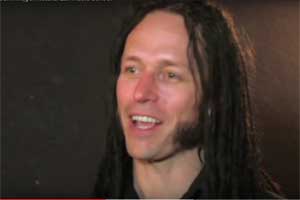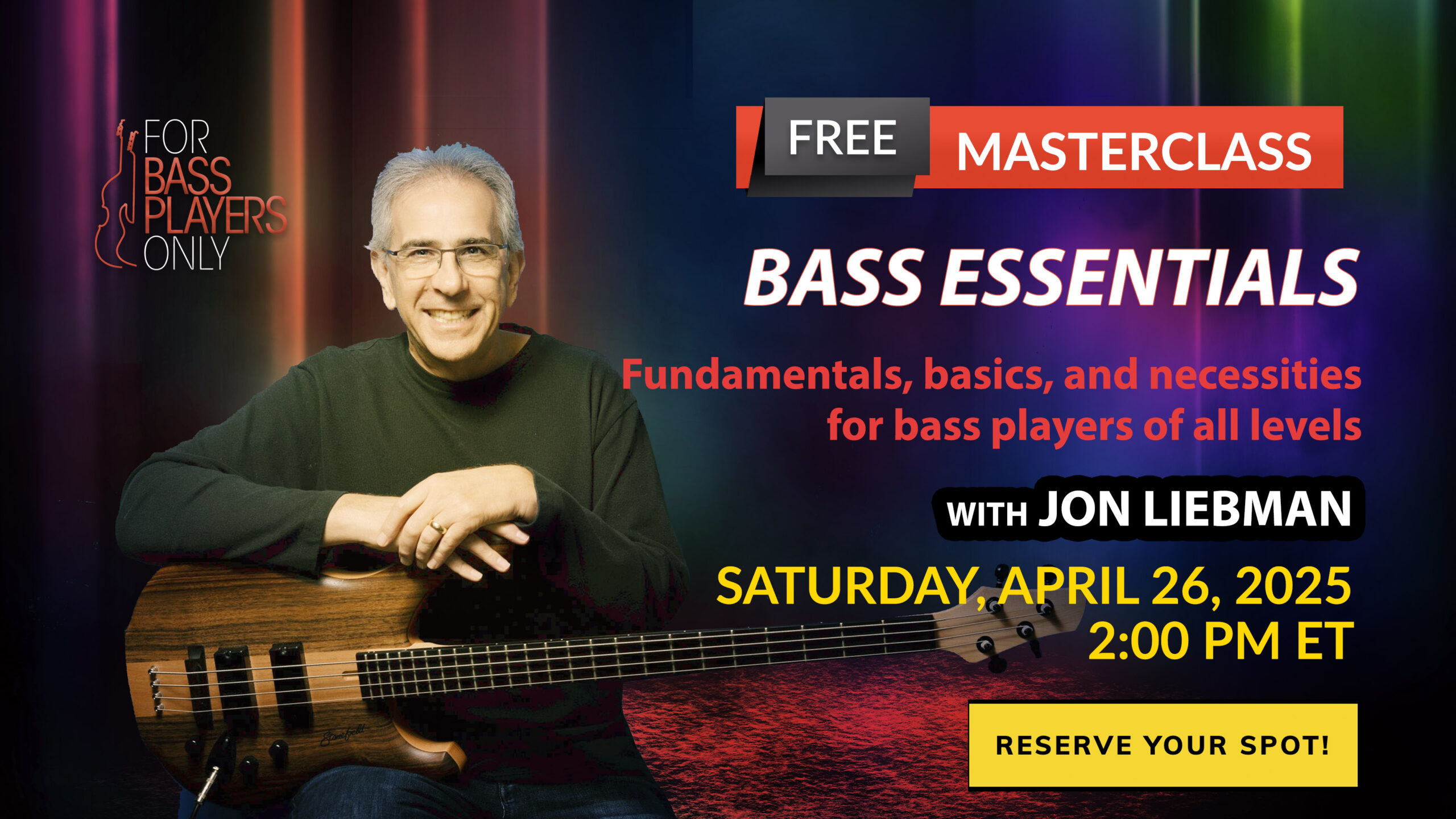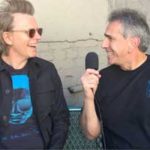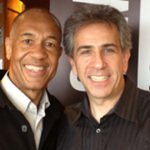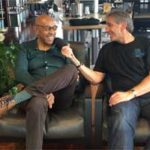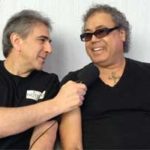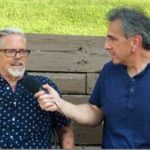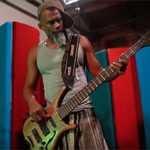Hard rocker talks to FBPO about the gigs with Distrubed and Adrenaline Mob, plus his rock school and lots more
Exclusive interview with FBPO’s Jon Liebman
July 1, 2013
John Moyer is the bassist for Disturbed and Adrenaline Mob. He is also the owner/director of Natural Ear School of Music in Austin, Texas.
FBPO: How would you describe your musical upbringing?
JM: Well, neither of my parents were musicians and I was raised on a ranch in El Paso, Texas. I had no brothers or sisters, so I grew up listening to what my parents listened to, which was country music, Hank Williams, Jr., Johnny Cash. When I was 7 or 8 and my dad took me to see Johnny Cash. I still remember it.
FBPO: Did he play “A Boy Named Sue”?
JM: Yeah! It was a Folsom Prison Blues concert . He played the Civic Center in El Paso, Texas. I didn’t really have much of a modern musical upbringing with what my parents listened to. Then, when I was in junior high, MTV was out and, although I didn’t have cable, I used to watch Friday Night Videos. The video shows were a big thing. People don’t understand that today. You can watch any video you want now, but when I was growing up, you were stuck with whatever was on TV at the time. It was the only time they ever played music. People from my generation, we all remember Friday Night Videos. That’s the first time I saw Van Halen’s “Jump” and I was like, “Oh my gosh, what am I looking at?” The first record I bought was 1984. I loved it so much, I bought the cassette tape. I bought one for myself and one for my friend so he could listen to it too and we could talk about it.
FBPO: How did you become a bass player?
JM: I was always into performing. I had done plays and things like that when I was in elementary school and I was in choir, so I sang a lot. Not that I’m a good singer, I just like to do it. When I started really getting into theater in high school, I was not liking it as much because, by my freshman year, it didn’t do it for me anymore. I loved being on stage, but I didn’t always like the parts that I had to play. My best friend played guitar. I was amazed with his guitar playing and I was always asking him to show me stuff. In my freshman year of high school, we wanted to start a band. My two friends played guitar, we already had a drummer, so what do I do? And they went, “Here!” and they handed me a bass. And that’s how it all started.
FBPO: Your story is not dissimilar from that of many other bass players. “Nobody else wanted to do it, so I did it!” That’s my story as well.
JM: You know, it’s so interesting because I realized I knew nothing about music. When I sang, I was never taught scales and theory and notes. I didn’t know anything. I just always had really good rhythm. I ended up developing my own style. I never took lessons, so I never became a finger player. I was always a pick player. At the time, Metallica was really big. When I was getting into my sophomore year of high school, we were playing a battle of the bands. I was so into it! We were rehearsing two or three times a week. We learned every song from Appetite for Destruction. I probably learned ten or fifteen Metallica songs, too.
It was all new music to me because I didn’t grow up with it. So they were like, “Check out Black Sabbath.” Next thing I know I’m listening to Black Sabbath, and it’s all new to me. I learned a bunch of Geezer (Butler) stuff, and then we’re doing Pink Floyd and classic rock, and for me, like I said, it was all brand new.
My high school years kind of had me going backwards in time and figuring out what music was about. Not just hearing what’s on the radio today, but being introduced to stuff from the past. My best friend’s dad was a big music buff. He was always playing us Jimi Hendrix and Sabbath and Ozzy, so it was through him and his family that I got my musical education. We would jam in his bedroom with a drummer and a guitar player. We always had revolving door singers, so whenever we had a gig and we didn’t have a singer, I would be the one to sing. We had a guy who’d come in every once in a while.
FBPO: What was your parents’ reaction to this music that they were, I would assume, pretty unfamiliar with, Black Sabbath and the other groups that you mentioned? As people who were used to listening to Johnny Cash and Hank Williams, Jr., how did they respond?
JM: Very supportive. My mom bought me my first guitar. After I discovered music and started playing it, my mom told me that my grandfather—her dad—was a big band leader in the ‘30s and had his own band, even. He was the boss of the band. It was a twenty-piece orchestra and I didn’t know that, so I think she was happy to see her dad in me being a musician. My parents were divorced, so I think they were just happy I was into something that held my interest because, at the time, I wasn’t doing well in school. I had a lot of distractions, like some kids have, and education wasn’t really a focus in my household.
FBPO: What about the transition from the school stuff and the battle of the bands to an actual career? How did your career actually begin to take off? Was there a defining moment?
JM: To me, even in high school, it was a career. I knew I was going to do it and I was going to do it as hard and as good as I could. We played backyard parties. I would organize other bands to play gigs with us, then we did the battle of the bands stuff. When I turned eighteen, I answered an ad in Craigslist for a cover band and that’s really where I got good because I was playing with guys who were way better than me. I was the youngest guy in the band and we were doing three- to four-hour sets on the weekends. I was playing every Friday and Saturday, sometimes Thursday, Friday, Saturday and Sunday. I started playing all the different restaurants and bars in El Paso, Texas. We were playing everything from Stevie Ray Vaughan to Metallica. We had a really good singer, so he could just sing anything. My guitar player was a shredder and so I was just like, “Okay, this is cool.”
I spent a year doing covers. I was already kind of doing that anyway, but now I was doing it professionally. I was getting paid. At the end of the weekend, I’d get my couple hundred dollars. That was my job and I just kept at it. I started an original project at the same time, so while I was doing covers, I had an original band that I was taking into the studio in El Paso and recording with.
When I turned nineteen, it kind of felt like I had reached the end of my opportunities in El Paso. I had played at every bar there was to play, I had recorded in the studios in town and I felt like, “Well, what’s next? I think I need to move.” So I moved my band to Austin, Texas. Austin, Texas was the live music capital of the world. We have South by Southwest here. I still live here today. I’ve been here nineteen years now. But that’s what I did. I just moved my band to Austin, Texas.
FBPO: That’s a great story.
JM: I’ll take it a little further, here. I’ll just kind of keep on going down the road. That band kind of fell apart. I answered an ad in the paper for a band called Soak and I knew the singer and the drummer. So I called them up and said, “You guys are looking for a bass player?” I had watched these guys and I really liked their style, so I went, I auditioned, got the gig. They were a real hard-working, original band, with cool music. We recorded a great EP in Austin and then, about a month later, we secured a deal with Rainmaker management. A month after meeting them, we got signed to Interscope Records via an LA Showcase at a club. This was in 1996 and I was just turning 22.
FBPO: How did the Disturbed gig come about?
JM: Not for awhile. I did Soak from ’97 until 2000. We did what we could on Interscope, but it didn’t happen. We got to tour the nation and that was cool, but it never really broke. And then the music started changing. Our singer was into the lighter stuff and I wanted to play heavier stuff. So a band came along called the Union Underground, based out of San Antonio. They asked me to play bass for them when they were signed to Columbia Records, so I joined them. I recorded some songs, “South Texas Deathride,” “Turn Me On Mister Dead Man” and a couple of other songs. Those two that I mentioned, especially “Turn Me On Mister Dead Man,” were top singles on rock radio.
Union Underground did a little touring in Europe. We did Ozzfest and we toured with Manson. When it came time to do a second record, we really couldn’t pull it together, so my last gig with Union Underground was Halloween 2003. For the first time 10 years I was bandless.
In March of 2004, Disturbed announced that they were going to hold open auditions for a new bassist. One audition in LA and one in Chicago, anyone can show up. So I showed up at the Chicago audition. I stood in line. I didn’t tell them I was there—I had their numbers, but I didn’t tell them I was there. I stood in line with about 245 other bass players. I was number 60 in line. I remember I waited about six hours before I could get in front of them. They had a lot of people to go through.
I walked in, David (Draiman), singer for Disturbed, sees me and he goes, “John, what are you doing here?” and I go, “Dude, I’m here for the same reason all these other guys are here. We’re here for this gig. It’s really cool you guys are opening up your doors and giving everybody a chance.”
I got up in stage, and played along with the song on CD. I played one song for them, “The Game.” When I was done, I closed my bass case, looked at the guys and said, “You know, you’ve got a lot of great people out there waiting to come in. I’m not going to waste any of your time. Thank you for the opportunity. I hope you guys find somebody great,” and I walked out.
Their management chased me out into the parking lot and asked me to come back the next day for an audition with them, so I was like, “Wow, I get to play with the band!” I come back the next day. I jammed with them, I had a great time, and I left. They called me a week later and told me I had the gig.
FBPO: That must have been a very long week, I bet. You’ve been with that band for a while. You must have at least one good story to share with our followers. Maybe a good road story?
JM: Yeah, but you know you can’t talk about those. [Laughs]
FBPO: [Laughing] Why does everybody say that?!
JM: All the good ones you can’t talk about! There are all kinds of great stories. To tell you the truth, the most inspiring thing about being with Disturbed is how passionate the fans are and how they’re affected by the music and the lyrics.
We recorded Ten Thousand Fists together. That was my first record with the band. While we were on tour with Ten Thousand Fists, we had so many people and so many soldiers and relatives of soldiers that would come up to us and tell us what an impact our music had made on them. It would give them strength and power on their missions. They used our music to give them the fearlessness that they needed to do what this country was asking them to do.
One of the most poignant stories was when a battalion leader came in and gave us his bronze star. He had two bronze stars and he said, “I had a six-man group. We were in Iraq for almost two years. We listened to Disturbed going out to every mission and we listened to Disturbed coming back from every mission. You guys were our seventh member,” and he presented us with a bronze star. None of us were in the military and none of us put our lives on the line. He was very adamant that we accept it and so, begrudgingly, we accepted it and Dan Donegan, our guitar player, said, “We’re just going to hold onto this for you, okay? This is a huge honor for us.”
It’s things like that. It doesn’t matter how many shows you do or how many parties you’ve played at or whatever. At the end of the day it’s how your music affects other people and how it’s received. I think most musicians agree with me on that level. Ha! I know you were hoping for some kind of party story.
FBPO: No, that was a perfect story. That was beautiful.
JM: That’s the important stuff. There are many stories like that.
FBPO: Well we’ll get together in person someday and you can share those other stories with me.
JM: Sure, when the recorder’s not on! [Laughs]
FBPO: How about Adrenaline Mob?
JM: Adrenaline Mob, great band! Disturbed decided to take a hiatus in August of 2011. I wanted to stay busy so I kind of put my feelers out into the industry to see what was out there for a bass player like me.
Mike Portnoy gave me a call and said, “I’ve got this band called Adrenaline Mob.” Now, of course Mike Portnoy is known for his progressive chops in bands like Dream Theater and Trans-Siberian Orchestra and that’s definitely not my cup of tea. Maybe one of these days I wouldn’t mind being in a band like that. I dabbled in some of that in my early years of playing, but I think ultimately I’m a rock/metal guy. He sent the music to me and it was right up my alley.
Russell Allen, the singer, is phenomenal. He also sings for a prog metal band called Symphony X. He’s got massive range, tons of power, and his endurance is ridiculous. He could do nine shows in a row and it doesn’t even affect him. Then, of course, Mike Orlando. He’s a shredder guitar player. He does clinics in China and Japan for Charvell and his other companies that sponsor him. He’s got this very unique, cool style that I’ve never seen before.
So, musicianship-wise, Adrenaline Mob is just fantastic. When I joined the band, they had already finished the first record, so I didn’t get to record on the debut album, but we did put out an EP of covers this year called Coverta. I’m very proud of my work on Coverta. We did a couple of Dio songs, we do “Barracuda” by Heart, we do a Van Halen song. But really, my proudest moment on that record, and the fact that John Paul Jones is one of the greatest bass players ever, is we do a cover of “The Lemon Song” by Led Zeppelin. Any bass player who really knows Zeppelin knows what an amazing musician John Paul Jones is and that song in particular. If you listen to the bass line, it is amazing. I knew that if I didn’t do it right I was going to get crucified. [Laughs] I did my due diligence on it and I turned in what I feel was the best bass performance of my career.
FBPO: We just learned you’re going to be filling in for Rudy Sarzo in Queensrÿche for a little while. How does that make you feel?
JM: Surreal. When I was in high school, I got to see the Empire tour and they played “Operation: Mindcrime” from beginning to end, with big screens. The production was insane. I’ll never forget it. They were a huge influence on me growing up, so it’s a bit of a full circle. I’ve got a lot of friends from high school who are like, “Disturbed is cool. But you’re going out with Queensrÿche. That’s so cool!” It’s hilarious.
It’s a total honor to work with Geoff Tate. And when it comes to Rudy Sarzo, I have played more of his bass lines than you can imagine, playing all the covers with my cover band back in the day. Rudy is a huge influence on me. I’ve known him for a few years now, and it was through him and his brother Robert that I got recommended for the Queensrÿche gig.
It’s so funny. This is so recent. Just last month, I was sitting with my wife. Adrenaline Mob was going to tour South America in June, but they want us to work on a new record, so we’re not going to be touring this summer. I was kind of talking to her about how I’m not sure what I’m going to be doing this summer. All of a sudden, I get this text message and it says, “Hi, John. This is Geoff Tate from Queensrÿche. Would you mind filling in for a few show dates?”
They came through town and I met them in Austin. We talked about what he’s expecting of me because there’s a lot of background vocals that I’m going to be covering as well. It’s not just going to be a bass-playing gig. It’s going to be a singing gig too. I’ve had a really good time learning all the songs. It’s a 21-song set list, so I’ve definitely got my work cut out for me.
I have a very busy schedule this month! I don’t know if you know this, but I do help out with an organization called Rock Fantasy Camp. Are you familiar with that?
FBPO: Oh, sure.
JM: Basically, they brought me in to help out with various camps. I’m going to Vegas to do a Rock Fantasy Camp gig with Lita Ford. Lita and I are going to do a 20-song private gig with Bruce Kulick from Kiss, Teddy Z and Lita’s drummer, Bobby. Then I fly to New York City that night to do a gig the next day with new artist New Day Dawn, who I produce. Then after I play the gig with New Day Dawn at the CD release party, I fly to Seattle for the Queensrÿche rehearsals that start the next day. I’ve got 43 songs in the next seven days that I’ll be performing on stage. I have never pushed myself this far! I am looking forward to the challenge. Wish me luck! [Laughs]
FBPO: Not too mention being a ping-pong ball in the process!
JM: Yeah, there’s that. I’m definitely preparing myself to travel. I’m already thinking ahead of time when I’m going to sleep!
FBPO: I know, in addition to all that bass playing, you’re also an educator. What can you tell us about that?
JM: When people approach me about bass, I tell them, “Look, I’m not going to teach you a Disturbed bass line or show you what I play on stage.” I mostly try to teach tools that I use so that other artists can develop their own personality. A lot of people ask me, “How do you write a bass line? I know what the guitar is supposed to do, but what am I supposed to do? Am I supposed to play along with what the guitar player does? How do I get out of that box?”
That’s what my bass DVD is about. I’ll tell you, it’s not for advanced players. It’s definitely at a beginner/intermediate level, but perhaps advanced players could find some meaning in it as well. There’s not a lot of shredding in it. It’s definitely the basics and the foundation, which, to me, is what playing bass is about.
Basically, I do certain exercises that show a four-chord sequence with a drumbeat behind it. Then I show various ways you could write a bass line underneath it: one using roots, one using octaves, one using fifths, one using chromatic runs up and down and combinations of each. By the time you go through the DVD and get to the last four-chord riff, I’m doing a combination bass line, showing how to use all of those techniques. The idea of it is to show young bass players basic tools that they can use to write their own bass lines.
FBPO: That’s great. It’s like, “Teach a man to fish…,” right?
JM: Exactly! I’m not showing them how I do a riff, I’m showing them how they can do a riff. My bass DVD is basically an extension of what I do at my rock school here in Austin, Texas called Natural Ear Music.
FBPO: That was my next question.
JM: You can check out our website. We teach kids how to rock! We give individual lessons, but our biggest focus is putting kids into bands because that’s how I learned. I learned how to play music as a band, in a band environment, feeding off the chemistry of other musicians and learning songs. We teach kids aged 7 to 17, We put kids in bands according to their age and their interests. We run a great summer camp program and we also run a semester program.
FBPO: I read something recently very cool about you, that you composed music for a video game. Tell me about that.
JM: Sure, sure. Sometimes I just get inspired and I start writing stuff. So about five years ago, I wrote this musical piece. I don’t even know what it was. It was sort of like this rock, synth orchestra montage thing and it had this haunting thing going on. I didn’t even know what I was doing at the time I finished it. I was like, “Wow, that would be cool music for a video game” like Halo or something like that.
So I just kind of put it in my back pocket, forgot about it. Well, I was in London, on tour with Disturbed, and we were at a bar hanging out. Somebody bought us a round of shots, so we bought them a round of shots. Then they bought us another round of shots and I went over and I’m like, “Who are you guys?” and we started talking. They were Americans and one guy said, “I do video games.” We sort of hit it off and I said, “I actually have a song that I would like your opinion on to see if you think it’s something I should shop around and try to find a video game home for it.” So I sent him the song that night. The next morning he calls me, “We have to have lunch!” We had lunch that next morning and we signed a four-song contract. He said they sent it to all his developers, they loved the song, and they want it to be the theme for their video game. Then I ended up writing three more songs for them.
FBPO: That is a great story.
JM: Once again, you just do what you do and make the most of your opportunities.
FBPO: How about the future, John? What else would you like to do that you haven’t already accomplished?
JM: I feel like I’m just getting started. I want to keep playing music in bands, I want to put out a record this year of original material with Adrenaline Mob. I’m looking forward to when Disturbed reunites. That might not be for a couple of years down the road, though.I’d like to see my school grow, I’m currently working on a location in San Antonio. Inspiring young musicians gives me a lot of joy, so I’d like to see that happen.
Ultimately, I think I would like to do more production work, like I did for the video games. Whether it’s for television or movies. Also I get to stay home. I have a couple of kids and a beautiful wife. I spend so much time on the road that when I can have a gig like that where I can work in my own home studio, I really love that. I’m going to be targeting my attention towards producing other bands and composing more music. I’m hoping to open up that avenue more for myself. You can check out several of the bands I work with on my website.
FBPO: What would you be if you were not a bass player?
JM: I think I would’ve pursued acting or some aspect of it. I love the performance arts, so I think that’s probably what I would have done. Maybe because I’ve performed so much over the years, I need to be on stage. I’ve always had that energy and that buzz to entertain people. I think I would’ve been an entertainer on some level.
